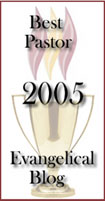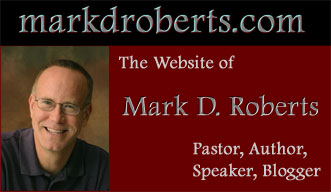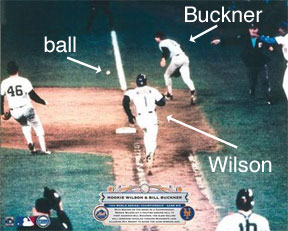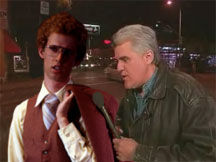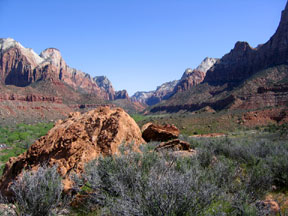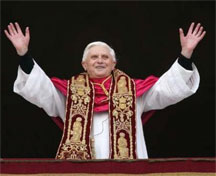| |
A Resource by Mark D. Roberts |
|
Archive for April, 2oo5
Note: This archive contains all of my posts for this month that are not included in some other series. I really don't have the time to save things in more than one place. If you're looking for a specific item, use the "Search" button in the upper left hand corner. Thanks. |
by Rev. Dr. Mark D. Roberts
Copyright © 2005 by Mark D. Roberts
Note: You may download this resource at no cost, for personal use or for use in a Christian ministry, as long as you are not publishing it for sale. All I ask is that you give credit where credit is due. For all other uses, please contact me at mark@markdroberts.com. Thank you.
A Name to Remember?
The introduction to my Easter sermon entitled "Honest Thomas"
Posted at 10:15 p.m. on Saturday, April 2, 2005
"Doubting Thomas." If you look up this phrase in the dictionary, you'll find something like: "one who habitually or instinctively doubts or questions." A "doubting Thomas" is somebody who always lags behind in matters of faith. A "doubting Thomas" always needs more proof, more time. A "doubting Thomas" has a hard time trusting others.
For years I've felt bad for Thomas. I mean, how'd you like it if your name went down in history attached to "doubting"? How'd it feel to know that every time someone uses your name it had a negative connotation?
Of course Thomas isn't the only person in history whose name is married to some depressing connotation. Consider the name "Bill Buckner." Now I'll bet that a whole bunch of you immediately associated this name with something awful. If you're not a baseball fan, let me explain.
Bill Buckner was one of the better players ever to play the game. In a 22-year career that began with the Los Angeles Dodgers, Buckner collected over 2,700 hits, had a career average of .289, and won a National League batting title. Yet he will always be remembered for one terrible moment in the 1986 World Series.
| At that time Buckner was playing for the Boston Red Sox, a team notorious for its failure to win the World Series (something finally overcome last year, I might add). In the '86 series against the Mets, the Sox took a 3-2 game lead. The sixth game went into extra innings, where the Sox scored two runs in the top of the tenth. Twice in the bottom of the tenth the Sox were one strike away from winning the series. But the Mets were tenacious, fighting back to tie the score at 5-5. With Mookie Wilson at the plate for the Mets and a man on second, Red Sox pitcher Bob Stanley was struggling to end the inning. On a 3-2 pitch, Wilson hit an easy little grounder up the first base line towards Bill Buckner. Scoop up the ball, step on first, and the inning would be over. But Buckner didn't get his glove low enough. The ball rolled through his legs, and the Met runner on second scored. So the Mets tied the series 3-3, and went on to win in the seventh game. |
|
| |
Moments after the ball skirted between Buckner's legs, he turned to retrieve it, but that damage had been done, and the Sox lost the game. |
From that fateful moment on, the name "Bill Buckner" has been forever tied to his "slow roller between the legs" error that lost the series for the Sox. In fact I did a bit of Internet surfing to discover that, sure enough, people talk about "pulling a Bill Buckner." It's synonymous with making a really bad, obvious mistake. You know, whatever else comes of my life, I really hope that by the end of it my name isn't synonymous with something bad. I hope our children aren't someday warning our grandchildren, "Now whatever you do, don't go and pull a Mark Roberts."
Part of my point in today's sermon is to come to the defense of "doubting Thomas." I'd like to suggest a new phrase for this disciple, not "doubting Thomas," but "honest Thomas." Hey, it almost rhymes! But, more importantly, I think it accurately portrays the character of the one who was willing to be honest even when it wasn't pretty, and even when others were not quite so truthful.
More importantly still, when we really understand what's going on with Thomas, we'll find new freedom to be honest about our own faith, or, as is sometimes the case, lack of it. Believe it or not, I'm going to suggest in this sermon today that you and I need to be more like Thomas, not by doubting more, but by being more honest with God and with each other. (To read the rest of this sermon, click here.)
Worship That Makes Sense
The introduction to a sermon entitled "Worship That Makes Sense"
Posted at 11:55 p.m. on Satuday, April 9, 2005
The Sensible Worship Survey
I want to begin with a question. When I first ask it, it might seem to be a rather "churchy" question. You know, the kind of thing that pastors and theologians fret about, but most folks find to be a tad irrelevant. But I believe this question is one of the most vital you can ever ask. If you answer this question correctly, your life will never be the same. I hope by the end of this sermon you'll agree.
Okay, so here's the question: What kind of worship makes the most sense? See, I told you, sounds kind of "churchy," doesn't it? Still, I want you to think about this with me: What kind of worship makes the most sense?
It would be fun to do a bunch of "person on the street" interviews like Jay Leno does on the tonight show, you know, those "Jay Walking" snippets, to see what folks "out there" think about worship. Suppose you went down to the Irvine Spectrum and talked with randomly chosen people. How do you think they'd answer the question: What kind of worship makes the most sense?
My guess is that first thing you'd hear is something like this: "Well, whatever kind of worship feels right to you." Sensible worship, from this point of view, is entirely a matter of personal preference, and it relates largely to your feelings. If something helps you feel spiritual, then this is sensible worship for you. |
|
| |
Jay Leno interviews someone who looks suspiciously like Napoleon Dynamite. |
If you were to keep asking folks at the Spectrum about worship, no doubt before long you'd be interviewing some Christians. From them you'd probably hear a description of worship that fits whatever they like at their own churches. From a traditional Christian you'd get a description of sensible worship that includes hymns, a choir, and printed bulletins. From a megachurch believer you'd hear about praise bands, uplifting, practical sermons, and state-of-the-art video projection. An emergent church worshiper might regale you with descriptions of edgy rock music, ambient darkness, and service to the poor. Though the details would differ widely, the bottom line would be essentially the same from all three types of worshipers: "Sensible worship is whatever moves me spiritually. It's what makes me feel God's presence."
The Sensible Worship Survey 2,000 Years Ago
Now I want to stretch your imaginations a bit further. Suppose you were taking this "sensible worship survey" not in the Irvine Spectrum in 2005, but in the Roman Forum 1950 years ago, at the time when Paul wrote his letter to the Roman Christians. In the Forum, surrounded by temples dedicated to the gods, what do you think you'd hear if you asked the average Roman: What kind of worship makes the most sense?
I'd suggest that just about everyone would give more-or-less the same basic answer: "Worship is what we do when we visit the temples of the gods. Sensible worship means offering sacrifices so the gods will treat us with favor." Temples, sacrifices, earning divine goodwill: that's what sensible worship was all about in the first-century Roman world, and throughout the ancient world in general, for that matter.
If you happened upon a philosopher while doing your survey in the Roman Forum, however, you'd probably get a different story: "Temples and sacrifices and all of that stuff are just external trappings," he'd explain. "The worship that makes the most sense is a matter of the mind, the spirit. It's more a matter of mystical feeling or philosophical reflection than offering sacrifices in the temples. The worship that makes the most sense is something that happens inside of you. It's not religious actions that you do." I expect you've noticed how similar this ancient philosophical perspective is to our contemporary understanding of sensible worship. Bottom line: it's what happens in your heart that really matters.
Sensible Worship from God's Perspective
In writing to the Christians at Rome in the mid-50's A.D., the Apostle Paul sought to answer the question: What kind of worship makes the most sense? To continue the sermon, click here.
The Beauty of Zion
Posted for Saturday, April 16, 2005
| Once again I'm going to follow my fairly common weekend practice by putting up something rather light and, I hope, fun. I'll get back to more serious stuff for Monday. |
| I just returned from a spring-break vacation with my family to Zion National Park in Utah. I though you might enjoy seeing a few pictures from our trip. |
| |
|
|
| The centerpiece of Zion National Park is Zion Canyon, a wide, deep gash in the multi-colored earth of southern Utah. Zion is smaller than the Grand Canyon, but doesn't lack anything in grandeur. You can drive to the floor of the canyon, which allows for an awe-inspiring bottom-to-top perspective. (You can see my children in this picture. Look for two tiny bumps on the smaller rock in the center of the picture. The bumps are my kids' heads. For a closer look, click here.) |
|
|
| |
|
|
| We camped in Watchman Campground in the southwestern portion of Zion National Park. Our trailer is the white spot in the center of the cottonwood trees, right alongside the light brown Virgin River. The leaves are just coming out on the trees, which gave the canyon floor a bright, spring look. The white mountains in the background are not snow-covered, but are white because of the color of the rock. The variety of rock colors in Zion is astounding, from deep red, to bright orange, to gray-black, to snow white. |
|
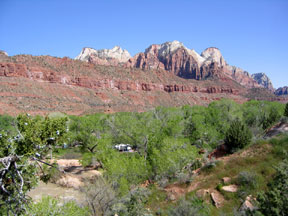 |
| |
|
|
If camping is not your preference, you might enjoy staying in Zion Lodge right in the center of the canyon. There are also a number of excellent motels in Springdale, on the southern edge of the national park.
Zion Canyon was formed (and is being formed) primarily from erosion. The Virgin River is responsible for the main canyon. In this way Zion Canyon differs from the glacially-formed valleys, such as Yosemite Valley. |
|
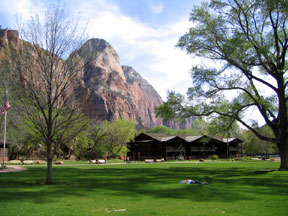 |
| |
|
|
If you've been reading my blog for a while, you know I like a strenuous hike. You can find these in Zion. But there are also many hikes for folks who like to do a a mile or two without too much effort. One of these easier hikes goes along the Grotto Trail on the floor of the canyon. The views through the cottonwoods are stunning, of course.
Zion is a popular throughout most of the year. Last time I was here it was August and the temperature soared to around 100 degrees in the daytime. This last week the daily highs were around 75 -- perfect for enjoying the wonders of Zion. |
|
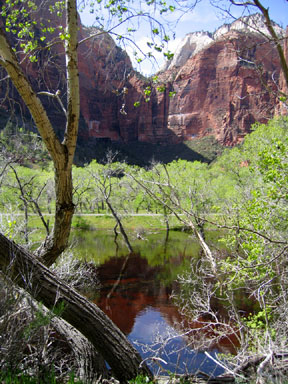 |
The Beauty of Zion: From the Sublime to the Ridiculous
Posted for Sunday, April 17, 2005
| Here are a few more pictures from my family's spring break trip to Zion National Park. Tomorrow I'll get back to more serious blogging. For now, however, enjoy! |
| |
The National Park Service no longer allows visitors to drive their own cars in Zion Canyon (except to the lodge, if you're staying there). Instead, all visitors must take free trams to the major canyon stops. This is a minor inconvenience, but a major improvement. There's no traffic in the canyon, with its noise, pollution, parking problems, etc. The trams run frequently and are fairly comfortable.
If you're not a hiker, you can enjoy the canyon simply by riding the tram and getting off at key points to look around. The picture to the right is from the top of the tram -- a fairly typical view. |
|
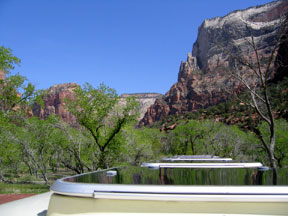 |
| |
|
|
| If you like hiking, however, there are several great options in Zion. We went on a four-mile roundtrip hike to Hidden Canyon. Some sections were so steep that there were chains installed to keep us from falling to a painful death. No kidding. Yes, that's my son on the right. There's no trick photography here, either. I recommend the hike to Hidden Canyon, but not if you're spooked by heights. |
|
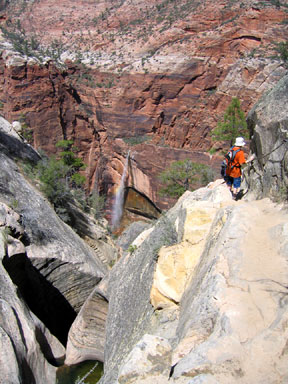 |
| |
|
|
Now for some fun . . .
After a while, you see all sorts of things in the canyon walls. They're a sort of rocky Rorschach test. For example, in the rock formation to the right, I swear I see the face of a man, rather a strong, squarish face. In fact, the resemblance between this face and a character from the soon-to-be-released Fantastic Four movie is striking. Check out the picture of Ben Grimm AKA The Thing from Fantastic Four movie website.
|
|
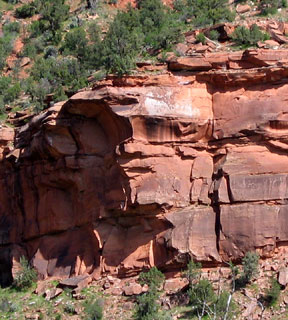 |
| This is a very made up Michael Chiklis, better known from the TV series The Shield. You've gotta admit he looks a whole lot like Zion's stone-faced man. |

|
| |
|
|
On the way to Zion we stopped at an A&W in Baker, California. I was impressed by A&W's latest campaign to get more business -- a cheese curds campaign. The fine print on the display reads: "Made with authentic Wisconsin white cheddar cheese." Indeed! I had always associated cheese curds with Wisconsin and Minnesota. But now you can get them in the high desert of California!
For those of you unfamiliar with this delicacy, cheese curds are on the way to becoming cheddar cheese, before it is processed and shaped into blocks. The curds are then deep-fried. Nothing improves the cholesterol like deep-fried cheese! The A&W version seem also to be breaded. Perhaps this explains why they are "curiously delicious," rather than merely delicious.
Now here's the kicker. You can enter a contest at A&W. If you win, you get free cheese curds for a year! So you'd better run out to your local A&W right now and enter. You can even get a coupon for a discount on cheese curds from the A&W website! |
|
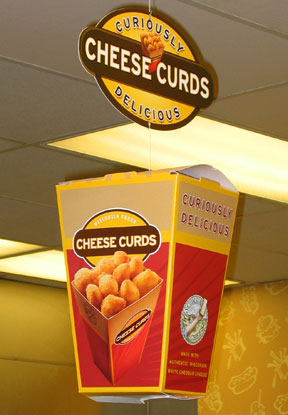 |
| |
|
|
Sorry the picture of the contest poster is so blurry. This is not trick photography, just bad photography. There is a real contest going on. The winner (one per A&W store) gets one serving of free cheese curds every week for a year.
Cheese curds or no cheese curds, I'd encourage you to make the trek to Zion National Park at least once in your life. It's also the place of one of the greatest hikes I've ever taken. Unfortunately the river was running too high last week for us to go on this hike. Nevertheless, Zion is a great destination.
|
|
 |
The Cardinal Sin of the New Pope
Posted for Wednesday, April 20, 2005
| Given the momentous election of Cardinal Ratzinger as the new Pope, I thought I'd take a short break in my "Blogging and Sainthood" series. I expect to get back to it tomorrow. (By the way, a fascinating discussion of Cardinal Ratzinger's ideas about the church can be found in an article by Richard John Neuhaus.) |
I'll confess that I was disappointed by the election of Cardinal Joseph Ratzinger as Pope Benedict XVI. Not that my opinion matters all that much, mind you. As a confirmed Protestant, who I wanted for Pope counts about as much as who I wanted for President of Iraq. Nevertheless, I had hoped that the conclave of cardinals in Rome might have chosen as Pope someone from the Southern Hemisphere. As a symbolic move, this would have been monumental, both for Roman Catholicism and for the whole church of Jesus Christ. But it's quite clear that the Catholic church isn't ready for such a bold move into the future.
When Karol Wojtyla became Pope John Paul II, he was virtually unknown outside of the Roman Catholic hierarchy (except in Poland, of course). The situation with Joseph Ratzinger aka Benedict XVI is quite different. As the Prefect for the Congregation for the Doctrine of the Faith, Cardinal Ratzinger had a very public record of enforcing Catholic theological standards, a task that included removing several prominent liberal theologians from official positions as Roman Catholic teachers. (For the list of those removed in recent years, click here.)
| Throughout the last few days, as the talking heads buzzed about Ratzinger's potential papacy, and during several news reports today, I was struck by the way many people in the media describe Ratzinger's efforts to reign in "loose-canon" Catholic theologians. They tend to use words like "narrow," "extreme," "ultra-conservative," and "divisive" to characterize Ratzinger's behavior. His cardinal sin – from a postmodern cultural perspective – is expecting Roman Catholic teachers to teach Roman Catholic doctrine, at least when it comes to major beliefs and hot-button issues. It's almost as if secular commentators envision the Roman Catholic Church as a modern university where the tenured professors can say anything they want without accountability. This seems to be both naïve and sadly out of touch with Roman Catholic reality. |
|
| |
Pope Benedict XVI. No this is not a picture of him singing "Shout to the Lord." Rather, he's blessing the crowds in the Vatican. |
I am not an expert in Catholic theology. Nor have I read extensively the writings of the theologians whom the Vatican disciplined under Cardinal Ratzinger's guidance. But when I was in graduate school, I did read some of the works of some of those theologians, including writings by Leonardo Boff, Matthew Fox, and John McNeill. I can remember wondering as I read their works how these folks got away with it, since their views seemed to contradict orthodox Christian theology, not to mention Roman Catholic theology. Matthew Fox's "creation spirituality," for example, seemed to me more New Age than Christian, and his flirtations with paganism seemed to go way over the line of acceptable Christian creativity.
As I understand it, Cardinal Ratzinger didn't censor these theologians or burn their books. He didn't try to take away their freedom to express their views. And, as far as I know, he didn't have them excommunicated (rather like being kicked out of the Catholic church, but not exactly; for clarification see William's post in my guestbook). He simply took away their right to express their non-Catholic views as recognized Roman Catholic teachers. Yet this, in the opinion of many critics, is an extraordinary secular sin. From my point of view, it's both defensible and, in fact, commonsensical.
I say this as someone who, were I a Roman Catholic, would be quickly dismissed from an official church teaching position. My views on many things (ecclesiology, papacy, sacraments, grace) are way too Protestant for a Roman Catholic teacher. But, given what I believe and teach, I would hope that I wouldn't expect to receive authorization from the Catholic church to advocate clearly non-Catholic doctrines.
I operate in a denomination that allows for much greater freedom of conscience in many things than the Roman Catholic Church. But even I have promised to uphold the basics of the Christian faith as it's understood in the Reformed tradition. If I were to reject these basics, to teach, for example, that salvation can be found apart from Jesus Christ, then I could lose my right to speak as a Presbyterian pastor. Yet I don't resent this sort of accountability. In fact, I would argue that if I ever were to teach that Christ is my savior but not the Savior of the world, then I should be removed from my office as a Minister of Word and Sacrament in the Presbyterian church. Actually, I hope I would have the decency to remove myself before others had to do the dirty work for me.
Consider a few analogies. If a Vice President for Apple starts publicly touting the benefits of Windows, should she keep her job? If a professional baseball player says, "Hang the rules. I'm going to take steroids anyway," should he be allowed to keep on playing without reprisals? If a university professor plagiarizes the research of others, should there be no consequences? If a reporter for the New York Times makes up facts in news stories, should that reporter keep his job? Every company, every organization, every institution has basic values and rules of operation. If people within that organization choose to reject the values or break the rules, then they are disciplined, and sometimes that discipline includes being excluded from the organization. To be sure, this sort of procedure can be abused by people in power. Sometimes it is vengeful and unjust. But sometimes it is both fair and just. If you're going to be a part of an institution that has clear values and rules, you must expect to live within them.
So, though I'm not privy to the details of Cardinal Ratzinger's actions as Prefect for the Congregation for the Doctrine of the Faith, in which capacity he was instrumental in disciplining many theologians, I do not think he needs forgiveness for upholding basic Roman Catholic doctrine. Now if he did so unkindly, or if his theological judgments were unfair, then these are sins for which forgiveness is necessary. But expecting Roman Catholic teachers to teach Roman Catholic beliefs is not wrong. And asking authorized teachers who contradict Church doctrine to revise their views is not wrong. And, if they refuse, taking away their Roman Catholic authorization is not wrong.
Though I'm quite sure Pope Benedict XVI has plenty of sins for which he needs forgiveness – as do we all – I don't think his enforcing of Roman Catholic theological standards falls into the sin category. The fact that so many secular commentators seems to think so illustrates the extent to which they just don't "get" Roman Catholic reality, not to mention the truth-centeredness of orthodox Christianity.
Home
|
